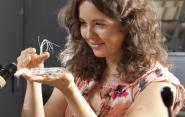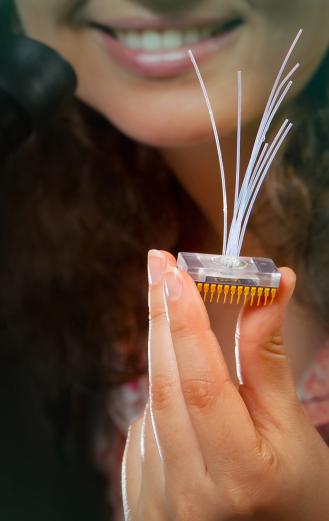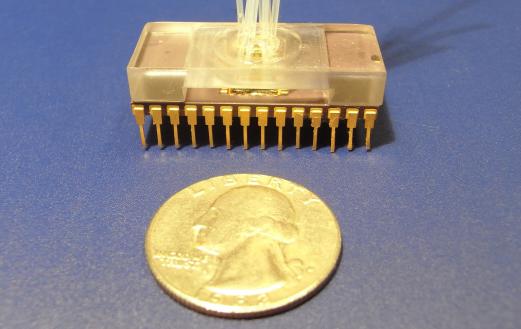Healthcare Innovation Spells Competition Success

In 2010, electrical engineering doctoral student Monika Weber came down with a bacterial infection. But as her doctor explained while writing her antibiotics prescription, the exact cause of her infection wouldn’t be known until the culture results came back four days later.
“A four day waiting time is terrible!” says Weber, who works in the lab of Mark Reed, the Harold Hodgkinson Professor of Electrical Engineering. “I was so surprised that, in the twenty-first century, technology hadn’t improved upon methods developed over a hundred years ago. So I got motivated to use technology invented in our lab to make a real difference.

The result is FluidScreen, a disposable electronic device that can detect bacteria in liquids like blood or water in less than 30 minutes.
With the press of a button, the device, which is about the size of a quarter, pumps the blood or water into an integrated microfluidic system that uses an electric field to separate any present bacteria from the liquid; nanowire field effect transistors in the device are then able to sense the small concentration of bacteria. When the analysis is done, the device sends the results to a smartphone.
“So, imagine you get a sinus infection,” says Weber. “Not knowing which antibiotic could treat the disease, a patient currently ends up using three or four antibiotics to clear the infection. This leads to any number of side effects and, on a larger scale, to the development of drug-resistant bacteria. With FluidScreen, the doctor would instead take a mucous swab from the patient’s nose and put it on the device. Within half an hour, he’d know which specific antibiotic will work on this specific bacteria, making the treatment much more efficient.”
Competition Ready
FluidScreen was originally developed as a project for one of Weber’s classes at Yale, but even then she was determined to bring the prototype to market. “The goal has always been to make it real, to develop the idea into a device that can actually help people,” she says. With support from her advisor, she continued to refine the technology after her class was over.
Her efforts soon received validation, with the device winning the 2011 Create the Future Design contest and netting her team $20,000 to continue development. Since then, Weber and her two cofounders, chemical engineering doctoral candidate Şeyla Azoz and School of Management MBA candidate Anthony Lynn, have continued to refine FluidScreen while also exploring the device’s many potential applications. In turn, their technology has received recognition from competitions in a variety of fields, from agriculture to blood diagnostics.
“Each competition has a slightly different focus,” says Weber. “But the consistent feedback has been that FluidScreen has the potential to innovate across a wide range of markets.”
Using such feedback, the team has chosen to focus the majority of their efforts on their device’s application to problems in healthcare and water testing. As a result, the team recently submitted their semi-final-round application to the OneStart Americas 2014 competition, a biotech innovation contest that seeks to find the “most compelling idea with the potential to impact the lives of patients.” Last week, the trio were also named finalists in the 2014 FLoW competition, a Department of Energy−sponsored contest designed to bring cleantech innovation out of the lab and into the marketplace; final judging for both competitions takes place in May.

“It’s very exciting to enter competitions. You get this incredible boost to go for it and finalize the concept, and then you also get to meet great people,” Weber says. “Each competition has connected us with mentors who are experts in their space—experts in healthcare, in manufacturing, in water testing and purification systems. As well, we meet lots of other teams, all with great ideas. It’s a wonderful experience to connect with people who are trying to innovate in their field. You just get all this vibrant energy.”
Closer to home, the FluidScreen team competes in the final round of Yale’s own 2014 Sabin Sustainable Venture Prize tomorrow morning at 9:00 am in the School of Management’s Evans Hall. The competition, managed by the Yale Center for Business and the Environment, awards $25,000 to the project that best advances a more sustainable way of life.
Leaders in the Making
In addition to the technology, both Weber and Azoz credit their competition success to their participation in the School of Engineering’s Advanced Graduate Leadership Program (AGLP), a competitive program that provides doctoral students with experiences and training beyond the research lab. Through the program, the team received coaching from professors at the Yale School of Management, thereby preparing them for submissions.
“By the time we started submitting, we already had a draft of our business plan, including managing our operations and figuring out the details of our the supply chain. So now, we’re able to focus on trying to understand what people actually need in water testing, what the demand is for it, and what kind of features are important for users,” says Weber.
But not only has the AGLP coaching been crucial to the team’s development, Weber argues out that she and her cofounders “grew together as a team through AGLP.” Both Weber and Azoz have taken classes at the School of Management, and their partnership with Lynn developed because of that collaboration between the School of Management and the School of Engineering.
“What I find really unique about Yale and the School of Engineering is this proud innovative thinking, this innovative culture. I was able to propose my new project and develop it from concept all the way through proof-of-concept and data validation,” says Weber. “This has been a fascinating interdisciplinary trip—crossing departments, crossing boundaries. Yale is a very unique place that allowed for that trip to happen, and now I just hope our project will help make a real difference in people’s lives.”

